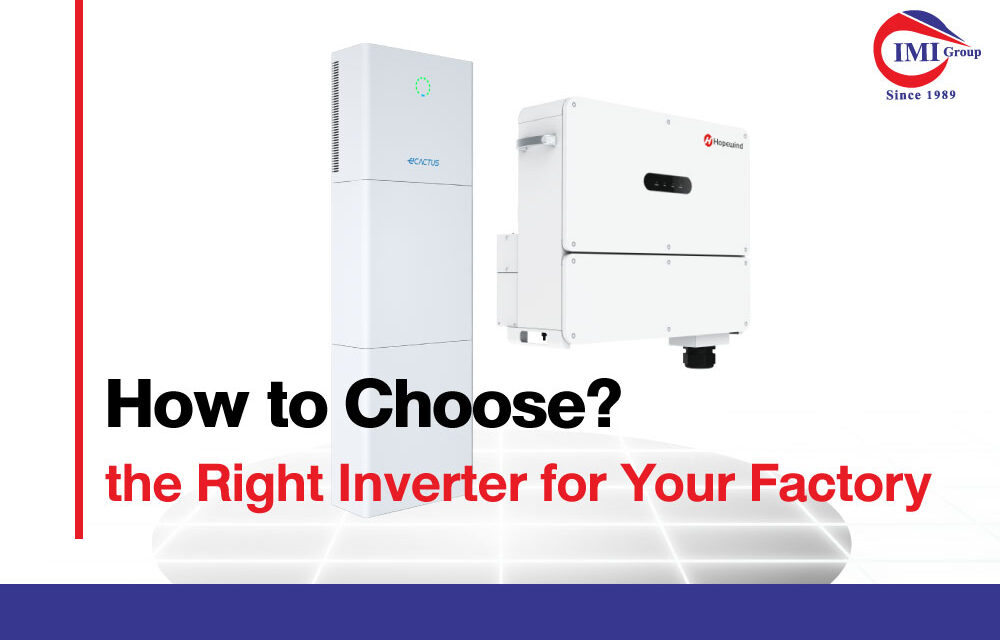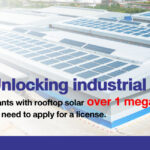An inverter is a crucial component in a solar cell system that converts direct current (DC) electricity from solar panels into alternating current (AC) electricity that can be used with various electrical devices. Choosing the right inverter is essential for the efficiency and lifespan of the solar cell system in your factory. In this article, we will discuss the critical factors in selecting an inverter, including information about inverter brands Hopewind and eCactus.
1. Evaluate the size of the solar cell system.
First, you need to evaluate the size of the solar cell system installed in your factory, including the number of solar panels and the total power (kilowatts). This information will be used to calculate the appropriate inverter size. Generally, the inverter should be sized close to the system’s total power but should not exceed 20% to ensure the system operates at maximum efficiency.
2. Select the inverter type.
There are several types of inverters to choose from, including:
- String Inverter: Suitable for small to medium-sized systems, with one inverter for multiple solar panels.
- Module-Level Inverter: Installed with each solar panel, ideal for areas with partial shade.
- Micro-Inverter: Similar to module-level inverters but smaller in size.
- Power Inverter: Suitable for large systems, installed separately from solar panels.
The selection of the appropriate inverter type depends on the system size, budget, and installation area characteristics.
3. Consider efficiency and features.
One of the critical factors is the inverter’s energy conversion efficiency. Higher efficiency means more electricity can be generated. You should also consider other features such as weather resistance, outdoor installation capability, performance tracking system, and remote control connectivity.
4. Durability and warranty.
A factory is a relatively harsh environment. Therefore, you should choose an inverter with high durability that can withstand heat, dust, and other environmental conditions. You should also consider the manufacturer’s warranty period, which will reduce the risk and cost of future inverter repairs or replacements.
5. Consider the brand and manufacturer.
Inverters from reputable and high-quality manufacturers will be more reliable and efficient. In this article, we will discuss information about inverters from the following two brands:
Hopewind: A leading inverter manufacturer from China, Hopewind offers a wide range of products, from string inverters to module-level and micro-inverters. Hopewind inverters have an efficiency of up to 98.8% and are certified with safety standards from international organizations. They also feature a Maximum Power Point Tracking (MPPT) function to improve performance.
eCactus: Another Chinese brand that produces high-quality inverters, eCactus focuses on designing inverters that are durable and suitable for use in harsh environments such as industrial factories. eCactus inverters have high heat, dust, and water protection systems and remote monitoring and troubleshooting functions.
6. Cost and return on investment.
While high-quality inverters may be more expensive, they provide a worthwhile return on investment in the long run due to their long lifespan and high performance. Therefore, you should calculate the cost compared to the electricity savings you will receive, including maintenance costs, to estimate the payback period.
7. Maintenance and after-sales service.
In addition to the inverter’s features, you should also consider the manufacturer’s after-sales service, such as training on use and maintenance, having a service center in the country, and repair/replacement services. Receiving good service will help extend the life of the inverter.
8. Keep track of and compare new products.
The inverter market is constantly developing and changing. Manufacturers are introducing new products with improved efficiency and features. Therefore, you should regularly follow news and compare new products to ensure you choose the most modern and suitable inverter for your factory.
Choosing the right inverter will directly impact the efficiency and lifespan of your factory’s solar cell system. By carefully considering various factors such as system size, efficiency, durability, warranty, cost, and after-sales service, you can select the inverter that best meets your factory’s needs.
IMI Industries, the leader in solar cell installation, is ready to serve you.
IMI Industries is a leading engineering, procurement, and construction (EPC) company for solar cell systems.
IMI Industries services:
- Design solar cell systems to suit your business.
- Install solar cell systems with high standards.
- After-sales service, inspection, maintenance.
Contact IMI Industries for consultation and quotation.





